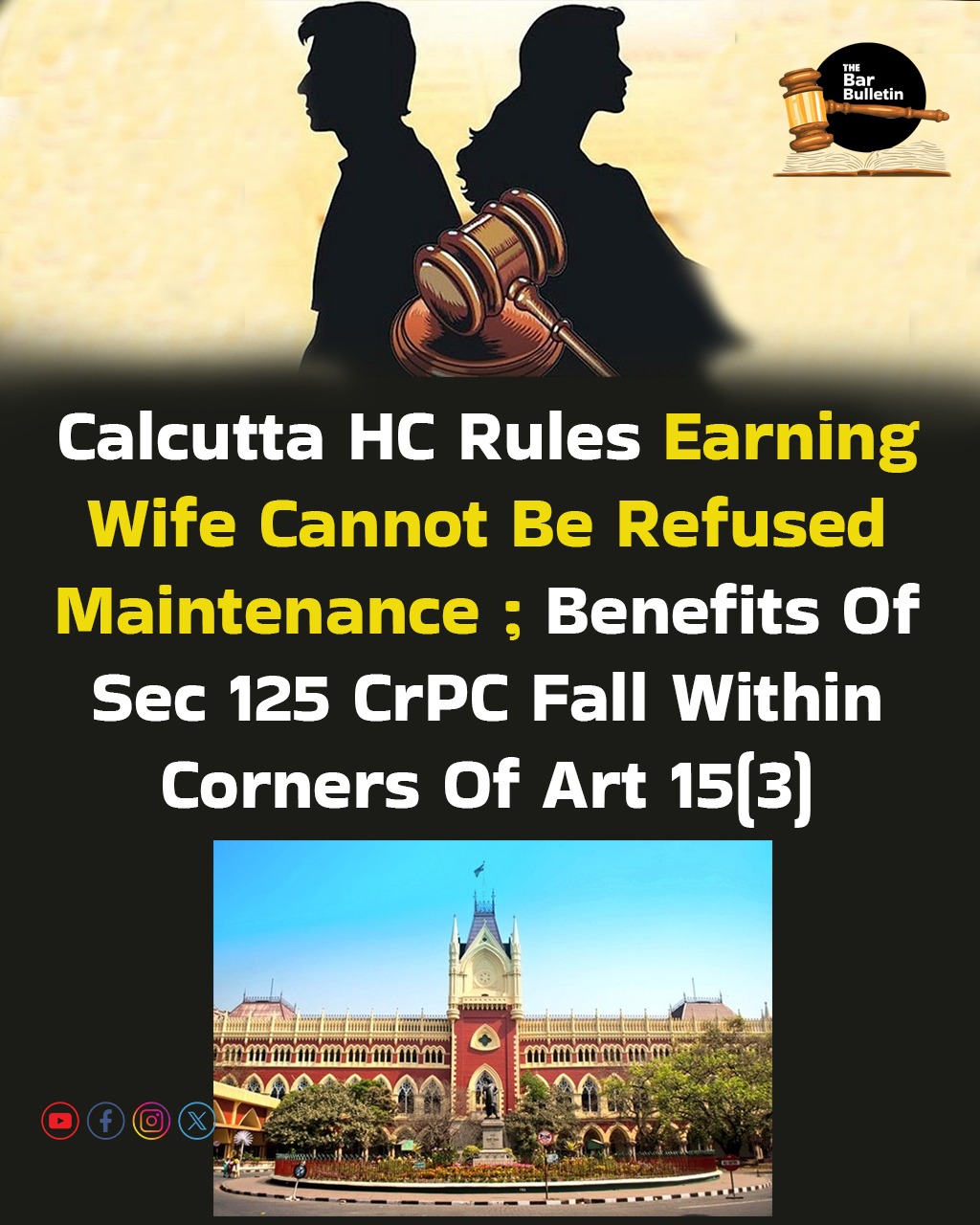The Calcutta High Court recently emphasised that a court of competent jurisdiction cannot shirk its responsibility of doing justice by branding the husband as ‘poor penniless person’ and advising the wife that ‘she should maintain herself within her income so long the husband does not find a job’. The Court elucidated that Section 125 CrPC was enacted to protect the vagrant wife and not to punish the husband, and the sacrosanct duty of the husband to provide financial support to the wife falls within the constitutional mandate of Article 15(3) reinforced by Article 39 of the Constitution of India.
A Single Judge Bench of Justice Ajoy Kumar Mukherjee observed that mere earning of the wife does not, ipso facto, render her ineligible to get the maintenance, and the object of section 125 of CrPC is to ensure sustenance of the wife at the same status and strata of the husband, but not merely an animal sustenance. The Bench clarified that the petitioner-wife’s earning of Rs. 12,000/- per month is no ground for refusing her maintenance. Additionally, suffering a sentence in default of payment as a probable consequence does not relegate the husband/opposite party’s responsibility to pay maintenance.
The Bench explained that the husband is obligated to maintain his wife, and he cannot escape from his obligation, pleading financial constraints, as long as he is capable of earning. He pointed out that even though the husband has admitted that the status of his family is higher than that of his wife’s paternal family, and that his father is allegedly maintaining all his expenses, he adopted a contradictory defence to rebut his liability. On the one hand, he alleged that in spite of being requested on several occasions, the wife refused to lead conjugal rights, and on the other hand, he disputed the marriage on the ground that it had not been consummated.
The Single Judge observed that the determining factor in the case of maintenance under Section 125 CrPC is the lifestyle and strata which the petitioner is entitled to, if she has been at her matrimonial house. Even though the husband failed to substantiate that the petitioner is leading the same lifestyle, the Family Judge refused maintenance merely because of the husband’s alleged plea of unemployment, and completely ignored the principle of the concept of equal strata and lifestyle, and that the husband cannot take advantage of his own wrong or wilful decision.
The Bench highlighted that the husband was sacked from his job due to his irregularity, and, not being a disabled person, he cannot remain unemployed unless he chooses to remain so. Such a wilful decision of the husband does not come within the purview of not “having sufficient means” to maintain the wife, and his decision to remain unemployed cannot be used as a shield against his legal obligation, nor can it be a ground for compelling the wife to survive her hardship.
The Bench observed that the Family Court, based on some guesswork and scanty material which does not even disclose the correct details, came to an objective assessment in favour of not granting maintenance to the petitioner/wife. The discretion imbibed under section 125 of the code does not permit the court to exercise its power or mechanically interpret the provision to frustrate the beneficial legislation for which the said provision was introduced.
Therefore, opining that the parameter adopted by the Family Court is something unheard of, the Bench quashed the impugned order and directed the husband/ opposite party to pay Rs. 4,000/- per month from the date of filing the maintenance application towards the maintenance of the wife. The Bench also directed the opposite party to clear the arrears amount of maintenance by twelve equal monthly instalments.
Briefly, in this case, the petitioner’s marriage took place under the Special Marriage Act, 1954, after which the couple went back to their respective paternal home. During the interim period, the couple lived together at the petitioner’s paternal home from time to time, and their marriage was duly consummated. However, the petitioner’s request for permanent shifting from the matrimonial home was regularly avoided, and later on, the opposite party and his family members threatened the petitioner with mutual divorce. When the petitioner lodged a written complaint, the opposite party and his family members did not allow her to enter, and they refused to return her the stridhan articles.
Exhausted, the petition filed an application under section 125 of the CrPC, praying for Rs. 10,000/- per month towards her maintenance. The Trial Court accepted the request and directed the husband/opposite party to pay a sum of Rs. 4,000/- per month to the petitioner towards interim maintenance, along with Rs. 5,000/- towards litigation costs.
Appearances:
Advocates Satadru Lahiri, Mahua Chattopadhyay, and Safdar Azam, for the Petitioner
Advocates Sandipan Ganguly, Debajyoti Deb, Shyamal Mondal, and Somdyuti Parekh, for the Opposite party



